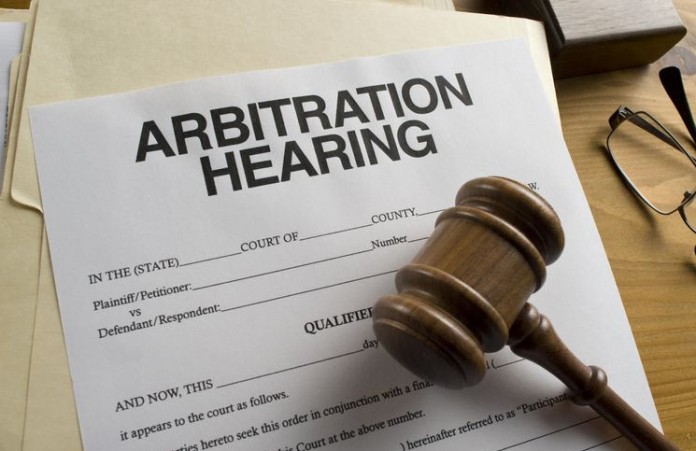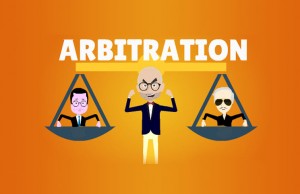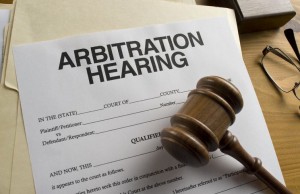In this blog post, Hari Manasa Mudunuri, a student of University College Of Law, Osmania University, who is currently pursuing a Diploma in Entrepreneurship Administration and Business Laws from NUJS, Kolkata, writes about the kind of evidence that is required in arbitral proceedings.
Introduction
Arbitration is the procedure, which allows parties to resolve disputes outside the purview of the courts. It’s an Alternative Dispute Resolution mechanism. Such proceedings are usually voluntary and consensual between the parties. Arbitration comes into play only when there is an Arbitration Agreement between the parties or when a clause for arbitration exists in the commercial contract between the parties. The presence of an arbitration clause obliges the parties first to resolve the matter through an arbitration tribunal, constituted in accordance with the agreement, and when such proceeding doesn’t satisfy either party, they can approach the court of law. If a party approaches a court of law about a dispute arising out of a commercial transaction and such a transaction stipulates an arbitration clause, the courts will not entertain such a suit, unless otherwise provided for in the statute.
Arbitration is a better option for parties as it reduces the cost of litigation; it isn’t time-consuming and is an easier alternative. Any commercial matter including an action in tort if it arises out of or relates to a contract can be referred to arbitration and not acts which are considered to be against the public policy like matrimonial claims, criminal proceedings, insolvency, etc. The characters of Arbitration can be classified as:
- It’s consensual
- Parties choose the Arbitrator
- Arbitrator is neutral
- It is a confidential proceeding
- The decision of the Arbitration Tribunal is final and easily enforced
- An ongoing dispute can be referred to Arbitration, and the court proceeding of the said dispute can be halted if both the parties agree in writing.
- The arbitration proceeding commences immediately after the issuance of notice by either party to the dispute.
- It’s not necessary to hold oral hearings
- The arbitration tribunal has the discretionary power in the manner of conducting the proceedings.
- The role of courts is restricted and will be invoked only in accordance with the Act.
- The number of arbitrators is determined by the agreement between the parties and also their mode of election.
The history of arbitration in Indian society can be traced to the Panchayat systems, the British India Legislations.
- The Arbitration Act, 1899
- Section 89 of the Civil Procedure Code,1908
- The Arbitration and Conciliation Act, 1940
- The Arbitration and Conciliation Act, 1996.
The 1996 Act is based on the 1985 UNCITRAL Model Law on International Commercial Arbitration and the UNCITRAL Arbitration Rules 1976. It provides for domestic arbitration; international commercial arbitration; enforcement of foreign award and conciliation. The Act is amended from time to time to meet the changing requirements.
In India, the Arbitrator has the right to choose – if the hearings are needed or if the documented evidence and written statements will suffice. They also decide the manner of producing and handling evidence during the proceedings. The Indian Evidence Act and the CPC,1908 don’t apply to the Arbitration proceedings. However, the general principles of the Evidence will apply, but a party under the Evidence statute cannot challenge the arbitral proceedings. The proceedings are conducted in accordance with the agreement to arbitration between the disputing parties, the applicable provisions of the statute, the discretion of the arbitrators and principles of Natural Justice.
Powers of Arbitrator
The arbitrators are subject to the provisions of the Act and the agreement between the parties while deciding arbitration cases apart from this they are free to decide the appropriate manner in which the proceedings need to conduct.
- Section 18 – The Arbitrators are bound to treat the parties equally, and each party will be given equal opportunity to present his case.
- Under Section 19 – The Arbitrator has the power to determine the admissibility, relevance, materiality and significance of evidence
- Subject to the agreement between the parties, the tribunal shall decide whether to hold oral hearings for the presentation of evidence or arguments or whether the proceedings shall be conducted by documents or other material alone.
- The arbitrator will hold an oral hearing if party requests unless there is an agreement between the parties to prevent the same.
- If a party fails to appear for the oral hearing, without reasonable cause or fails to communicate his statement, or produce evidence, the tribunal can decide the case ex- The tribunal will not treat the failure of the respondent as his admission and decide the case based on the evidence before it.
- However, if the Claimant fails to communicate his claim statement, the tribunal has the power to terminate the proceedings.
Evidence Under the Act
- The Indian Oath’s Act, 1969 extends to persons who are authorized by consent of parties to receive evidence.
- Section 8 of the said Act states that every person is giving evidence before any person authorized to administer an oath “shall be bound to state the truth on such subject.” Therefore, the tribunal can duly swear the witnesses are appearing before an arbitral tribunal and upon failure to state the truth under oath, he would have committed an offense punishable under the Indian Penal Code.
- The arbitrators don’t have the power to force unwilling witnesses to appear before the tribunal.
- Section 27, however, empowers the tribunal to apply to the court for assistance in collecting evidence as provided in the Model Law.
- If such a witness fails to attend in accordance with any order of the court or making any other default or refusing to give evidence or guilty of any contempt of the arbitral tribunal, shall be subject to like penalties and punishment as he may incur for like offenses in suits tried before the court.
- The court may either appoint a commissioner for taking evidence or order that the evidence is provided directly to the arbitral tribunal.
- Section 26 provides for appointment of experts by the arbitral tribunal for any specific issue and parties will be required to give the expert any relevant information
- It will be open to a party to require the expert after delivery of his report, to participate in an oral hearing where the parties would have an opportunity to put questions to him.
International Arbitration
Arbitration can be categorized into ad hoc and institutional. Institutional Arbitration includes the London Court of International Arbitration, International Chambers of Commerce, Singapore Arbitration Centre, Indian Council of Arbitration, Indian Institute of Arbitration and Mediation, International Center for ADR.
International Arbitration refers to the procedure when the commercial agreements and contracts are between different country nationals. It becomes difficult for the parties when disputes arise and the place to resolve these disputes. In India if one of the parties to a dispute is a foreign national then the Supreme Court alone can appoint the Arbitrator when such court intervention is required.
-
International Bar Association Rules of Evidence:
- IBA Rules of Evidence are widely followed in international arbitration proceedings. They were adopted by a resolution in 2010 by the International Bar Association.
- The Preamble provides that the parties and the tribunal are free to adopt the IBA rules wholly or partly, they are allowed to vary the rules or simply use them as guidelines to their proceedings.
- The rules are not limited or restrictive; these rules are flexible, and the parties and tribunal are free to adopt them as per the facts of the case.
- The IBA Rules contain 9 articles that deal with various aspects of evidence. They are:
- The Scope of application
- Consultation on Evidence issues
- Documents
- Witnesses of facts
- Party appointed experts
- Tribunal appointed experts
- Inspection
- Evidentiary hearing
- Admissibility and assessment of evidence
-
The UNCITRAL Arbitration Rules
- Article 27(4) provide that once a party offers evidence to prove the facts it relies on, the tribunal is required to “determine the admissibility, relevance, materiality, and weight of the evidence offered.”
-
The American Arbitration Association (AAA) International Arbitration Rules
- Article 20 (6) provide that “[the] tribunal shall determine the admissibility, relevance, materiality and weight of the evidence offered by any party.”
-
London Court of International Arbitration (LCIA) Arbitration Rules
- 22.1 (f) empower the tribunal “to decide whether or not to apply any strict rules of evidence (or any other rules) as to the admissibility, relevance or weight of any material tendered by a party on any matter of fact or expert opinion.”
Kinds of Evidence
- Extrinsic Evidence is admitted by the arbitral tribunal to determine the issue of an excess of jurisdiction. The court can resolve the ambiguity by admitting the extrinsic evidence.
- Fresh Evidence is when the three conditions are met-
- It must be shown that the evidence could not have been obtained with reasonable diligence for use at the trial;
- The evidence must be such that, if given, it would probably have an important influence on the result of the case, though it need not be decisive;
- The evidence must be apparently credible, though it need not be incontrovertible.”
- A person who is especially skilled and trained in the field for which his advice was sought provides Expert Evidence.
Admissibility of Evidence
- The arbitrator is not bound by the technical rules of procedure, which the courts have to observe, nor the Evidence Act, Limitation Act, CPC.
- Unless the parties expressly provide in the agreement, admissibility, relevance, and materiality of evidence are within the exclusive jurisdiction of the Tribunal
- Where the parties have not agreed to any specific procedure, the arbitral tribunal has to follow the statutory procedure. The arbitral tribunal has to follow the procedure under Sec. 19(4) of the Act
- An arbitrator must nevertheless observe the fundamental principles of natural justice.
- An arbitral tribunal is not bound by the technical and strict rules of evidence but, he must not disregard the rules of evidence which are founded on the fundamental principles of natural justice and public policy.
- A breach of the principles of natural justice would make the award liable to be declared invalid and inoperative
Conclusion
The National Arbitration laws provide for the discretion of arbitrators. The arbitral tribunals have the discretion to admit any relevant evidence and to reject evidence that is irrelevant or repetitious or unsuitable to prove the facts it purports to prove.
In the case of international arbitration, the parties are free to submit any evidence to prove the facts necessary to establish their cases. The rules of evidence in arbitration aren’t restrictive; they allow the parties to choose those rules, which will be convenient and relevant. This upholds the intention of arbitration, i.e. to reduce the court interface of the parties and have an easier alternative to resolve the disputes.
 Serato DJ Crack 2025Serato DJ PRO Crack
Serato DJ Crack 2025Serato DJ PRO Crack














 Allow notifications
Allow notifications



Hi
Hari Manasa Mudunuri
Thanks a lot
What can be the outcome of remanded (u/s 34) Award to the same Arbitrator for reappreciation of a document in evidence that had already been considered and taken effect of in the Award ?